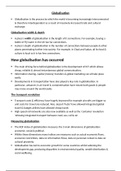Globalisation
Globalisation is the process by which the world is becoming increasingly interconnected
& therefore interdependent as a result of massively increased trade and cultural
exchange.
Globalisation width & depth
A place’s width of globalisation is the length of it connections. For example, buying a
bottle of Fiji water in the UK has far connections.
A place’s depth of globalisation is the number of connections between people & other
places penetrating further into society. For example, in Chad and Sudan, all its food &
culture is local so it is has few connections.
How globalisation has occurred
The main driving force behind globalisation is the development of ICT which allows
cheap, reliable & almost instantaneous global communication.
Information sharing, capital (money) transfers & global marketing can all take place
easily.
Developments in transportation have also played a key role in globalisation. In
particular, advances in air travel & containerisation have meant both goods & people
may move around the world easily.
The transport revolution
Transport costs & efficiency have hugely improved for example aircrafts are bigger so
unit costs for travel are reduced. Also, airport ‘hubs’ have allowed integrated global
travel & budget airlines have allowed cheap travel.
High speed rail networks are also now available as well as the ‘container revolution
‘allowing integrated transport between road, sea, rail & air.
Measuring globalisation
The KOF Index of globalisation measures the 3 main dimensions of globalisation:
economic, social & political.
Within these dimensions many indices are measures such as actual economic flows,
economic restrictions, data on information flows, data on personal contact & data on
cultural proximity.
Globalisation has led to economic growth for some countries whilst widening the
development gap, producing disparities in environmental quality, wealth distribution &
social wellbeing.
, Some economic measures of development are; income per Capita, GDP & economic
sector balance but these are often affected by anomalous values which can make a
country seem richer/poorer than it actually is.
Social development measures include the HDI index, Gender inequality Index &
environmental quality. These measures take into account factors useful for everyday
without primarily focusing on wealth.
Global trends indicate a widening income inequality, measured using the Gini
Coefficient, which reinforces the theory that globalisation has produced winners &
losers.
According to Kuznets curve, the more developed a place becomes, the more it cares
about the environment.
International Organisations
Definitions/key terms
Free trade is a policy followed by some international markets in which countries
governments don’t restrict imports from or exports to another country.
FDI is an investment made by a firm or individual in one country into business interests
located in another country. This includes may include offshoring, foreign merges, foreign
acquisitions & transfer pricing.
Free market is a system of economic exchange, in which taxes, quality controls, quotas,
tariffs, & other forms of economic interventions by the government either do not exist
or are minimal.
Economic liberalisation the lessening of government regulations and restrictions in
an economy in exchange for greater participation by private entities.
Protectionism is when a country shields is domestic industries from foreign competition
by taxing imports.
A tariff is a tax or duty that must be paid on a particular type of import or export.
A quota is a limited quality of a particular product which under official controls may be
produced, exported or imported.
Economies of scale– These are when more units of a good can be produced on a
larger scale, with fewer input costs. This means that as a company grows and production
increases, a company will have a better chance to decrease its costs.
National Governments
National government policies
National governments are key players in globalisation when they adopt policies that
allow TNCs to grow inside their country.
These policies include:





